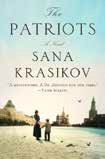by M.L.
A Sweeping Russian Epic for Our Time
 There’s a word we use to describe sprawling, epic novels that explore the limits of human suffering and the absurdities of political life: Russian. The tradition of those great 19th-century Russian novels never completely died. Even the Soviets, with their insistence on social realism and ideological purity, couldn’t destroy it.
There’s a word we use to describe sprawling, epic novels that explore the limits of human suffering and the absurdities of political life: Russian. The tradition of those great 19th-century Russian novels never completely died. Even the Soviets, with their insistence on social realism and ideological purity, couldn’t destroy it.
Now, Sana Krasikov, whose debut book of short stories, One More Year, won the Sami Rohr Prize in Jewish Literature, has produced an updated Russian epic. The scope of The Patriots (PenguinRandom House, $28 hardcover; $18 paper) is sweeping as it follows three generations of a single family from 1930s Brooklyn, through the perilous Stalin years, back to New York, before landing back in Moscow in 2008.
The Patriots delivers two storylines: the first follows Florence Fein, who grew up in middle-class comfort in Flatbush, NY. Entranced by the cause of Soviet socialism, she lands in Moscow, where she will spend the next four decades. This is before Stalin’s purges, the privations of WWII, and the virulent anti-Semitism that would see so many Soviet Jews imprisoned and killed.
Florence lives through it all. When she catches the eye of the authorities, she is convicted of being a political traitor and sent away to a work camp. Ultimately and grudgingly, she agrees to return to New York with her son and his young family after he is denied his Ph.D. because of Jewish quotas.
The second storyline follows her son, Yulik/Julian, as he returns to Russia in 2008, both to pursue a business opportunity in post-Soviet Moscow and to convince his adult son, who has moved to Russia to take advantage of the loose, deregulated, potentially enriching environment, to come back to the U.S. with him.
That’s the bare outline of the story. The details are what make The Patriots engrossing and powerful. Because Florence isn’t an innocent abroad, or not entirely. There is a willful naivete about her that allows her to be co-opted by the Soviet system. That turns out to be her redemption, if that’s the right word for someone who manages, by the skin of her teeth, to survive the Soviet gulag.
The Patriots tells a story I’ve never encountered elsewhere. As Americans, we have grown accustomed to thinking about the history of the Soviet Union in ways that have been repeated so often we don’t bother questioning them. We’ve accepted the notion that there were those who blindly followed Soviet doctrine and others who were victims of it. It’s a neat division that erases the complexity of human experience. Florence Fein is a fictional character, but Krasikov has noted that she is based on a friend’s mother, who was one of thousands of Americans who moved to Russia in the 1930s.
These people were real. They, like Florence, were complicated and contradictory and, in the end, many were disabused of their early idealism.
Florence, for one, was sincerely enamored by the promise of socialism, but she moves to the U.S.S.R. to follow adventure and, truth be told, a man. Her early years in Moscow aren’t drab. Life isn’t spacious, but it is full of fun. By the time she realizes that the winds have changed, that her horizons have shrunk to a few square meters, she is trapped. Although a secret part of her still yearns for the easy life she left behind in Flatbush, she learns to negotiate her terrifying new reality.
Florence is not always virtuous. She deceives those around her. Crucially, she deceives herself. She makes bad decisions, sometimes for good reasons, and sometimes for bad ones. She becomes a canny, compromised survivor. That’s the power of the system, both during the span of the U.S.S.R. and its aftermath: it erases the line between victim and accomplice.
Though it is punishing and continually knocks them off their feet, Russia has a hold on three generations of this family. In harkening back to that older Russian tradition, Krasikov has achieved the remarkable: she has created something utterly original.
M.L.
 Please wait...
Please wait...